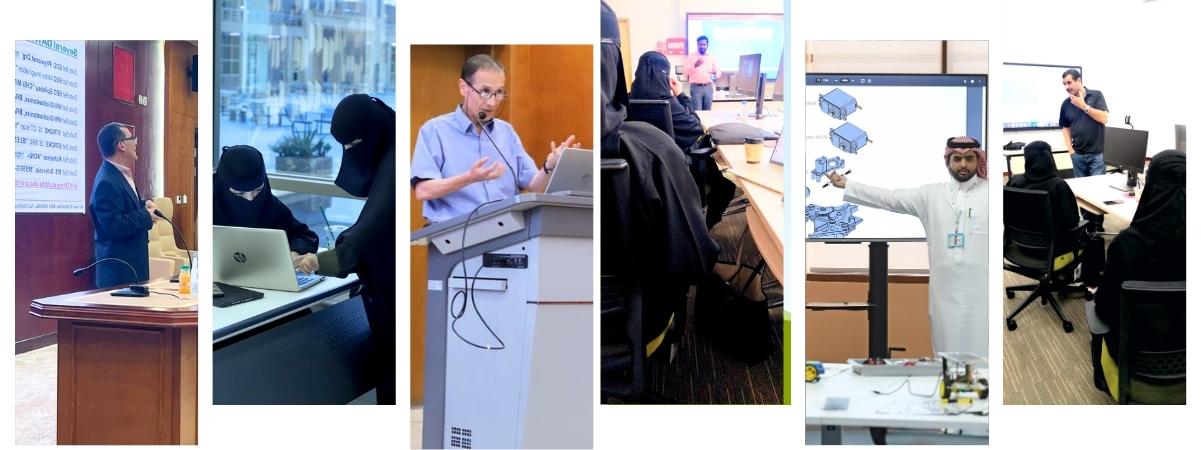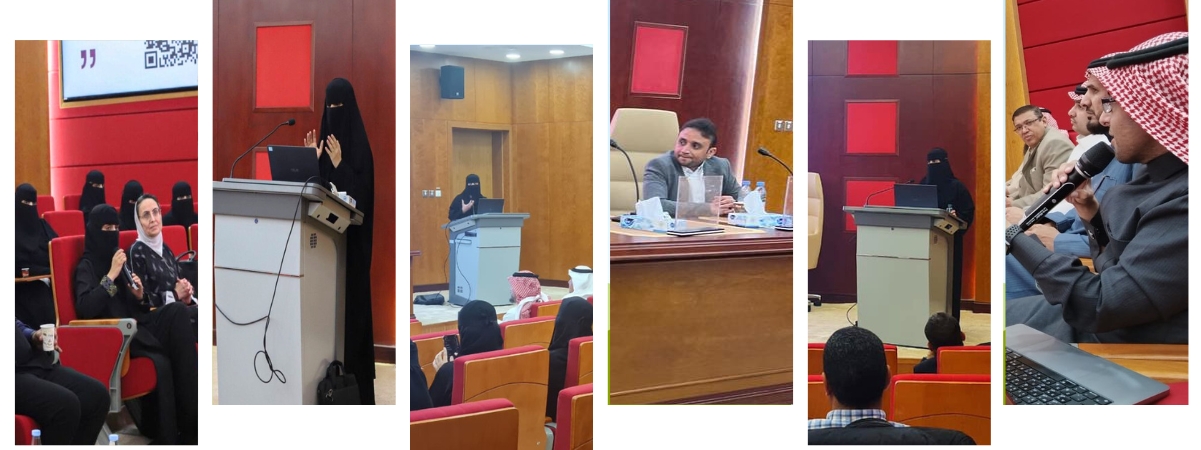
Scientific Research and International Collaboration Unit
|
Mission To provide high qualitytraining's and support to bothstaff and studentsinresearch and innovation. |
Goals
|
|
|
|
|
|
Scientific Seminar Series
|
2023-2024 Semester 2 (452) |
||
|
23 JAN - 24 |
|
Collaborative Recommender Systems: Similarity Computation and Learning |
|
B13 Room: 1-2-72 |
Dr. Mohammed Yahya AlShamri, Associate Professor, Computer Engineering |
|
|
30 JAN - 24 |
|
Signals and Images PROCESSING: Information Systems for serious pathologies' Exploring |
|
B13 Room: 1-2-72 |
Prof. Ahmed ElMokhtar Ben Hmida, Professor, Information Systems |
|
06 FEB - 24 |
|
Fuzzy analytical hierarchy process (Fuzzy AHP) and full consistency method (FUCOM) |
|
B13 Room: 1-2-72 |
Dr. Naim Ahmad, Assistant Professor, Informatics and Computer Systems |
More Details about Upcoming Events >>>
Contact:
Email: rdccs@kku.edu.sa

Computing and Informatics Journal Club
|
How it works
|
Mission Aspire to develop scientific research skills among faculty members and graduate students in the field of computing and informatics.
|
|
|
|
|
|
Journal Club Presentations
|
2023-2024 Semester 1 (451) |
|
01 NOV - 23 |
|
Detecting Crypto-Ransomware in loT Networks based on Energy Consumption Footprint |
|
Publisher: Springer |
||
|
Hall 31-G, PG Building |
Amjad Saeed Al Raiza , Student - Information Systems |
|
01 NOV - 23 |
|
Heterogeneous programming using OpenMP and CUDA/HIP for hybrid CPU-GPU scientific applications |
|
Hall 31-G, PG Building |
Zahra Fouad Sheekheen, Student - Computer Engineering |
|
08 NOV - 23 |
|
Efficient Data-Driven Machine Learning Models for Cardiovascular Diseases Risk Prediction |
|
Hall 31-G, PG Building |
Asma Mubarak Alqahtani, Student - Computer Science |
More Details about Upcoming Events >>>
Contact:
Email: malouane@kku.edu.sa@kku.edu.sa
Funded Research Projects
|
|
|
|
|
|
|
|
|
|||
|
|
Promising AI Research Tools Based on Advanced Methodologies Dedicated to Health Monitoring |
|
|
|
Software based Artificial Intelligence for COVID 19 - Prognosis |
|
|
|
Classification and Detection of Malicious Attacks in Health Care |
|
|
|
|
|
|
|
|
|
|
|
|
|
|
|
Advanced research for Medicine of nowadays is growing rapidly by using new technologies based on Artificial Intelligence ‘AI’ Techniques that could be efficiently maneuvered in order to provide very useful Diagnosis Aided Platforms ‘DAP’. This wide research field for various and serious pathologies aims to offer important health monitoring tools that could automatize different clinical actions facilitating rapid and exhaustive pathological exploration. ‘AI’ techniques for medicine needs concerns mainly the Medical Images’ Processing |
|
|
|
Medical imaging plays a pivotal role in pathology detection and treatment due to its multifaceted advantages and growing array of applications. These imaging modalities offer invaluable insights into tissue characteristics and functions while minimizing invasive procedures for patients. Furthermore, the expanding adoption of digital medical records for the storage and management of patient health data, especially medical images, is propelling the healthcare software sector. Medical image analysis tools are emerging as indispensable assets for hospitals and clinics |
|
|
|
The IoT interface must be monitored almost in real time in order to ensure the safety and security of productive activities. An intrusion detection system (IDS) is one of the prominent forms of network security technology that is used to safeguard the network. When confronted with the unpredictability of n/w technology and the diverse array of attack techniques, ML methodologies based intrusion detection systems seem useless. The use of deep learning strategies has shown the capability of accurately spotting intrusion anomalies in a broad range of scientific disciplines. |
|
|
|
|
|
|
|
|
|
|
|
|
|
|
|
Project Head: |
|
|
|
Project Head: |
|
|
|
Project Head: |
|
| Prof. Ahmad Hmeida | Prof. Naoufel Kraiem | Prof. Paul Rodrigues | ||||||||
|
|
ahmida@kku.edu.sa |
nkraiem@kku.edu.sa |
prigues@kku.edu.sa |
|
|
|
|
|
|
|
|
|
|
|||
|
|
Deep learning techniques to design an algorithm to secure enterprise documents against tampering and counterfeiting |
|
|
|
IoT based Advanced Intelligent Hospital Management System |
|
|
|
Investigation of heat dissipation in FinFET devices |
|
|
|
|
|
|
|
|
|
|
|
|
|
|
|
In today's world, information security is a critical responsibility. With the rapid development of Internet technologies such as the Internet of Things (IoT), big data, and cloud computing, individuals, government officials, and the military are encountering data security issues. With the rapid growth of data, researchers face a difficult issue in determining how to safely and effectively manage enormous amounts of data while building smart cities. The proposed algorithm determines whether or not the digital content has been tampered with. While the document features are kept, the produced code is spread to every pixel of the document, not just in non-interest pixels. |
|
|
|
The healthcare sector in this post-pandemic is currently facing a number of difficulties, including an inefficient workflow and serious concern of the public hesitant towards hospitals as considering a safe environment for further aversion of any contamination. Hospitals are one of the most essential and unavoidable things for the human health diagnostics but pandemic turns even hospitals into a harmful zone where people are highly worried about virus spread and other contaminants. Hence, this project proposal is made as a post pandemic Initiative to storm as a breakthrough for the health care industry by using RFID based MegaTag and Real Time Location Services RTLS solution (RTLS) towards the high safety filled Hospital Management Systems (HMS). |
|
|
|
Heat transfer problems in integrated circuits and especially in FinFET and MOSFET devices have a great importance in the semiconductor manufacturing in the last few years. Due to the continuous reduction of the channel length in nano transistors, the heat source becomes very important in nano transistors. To define the losses during energy consumption, two components have been identified; Dynamic power during uses and heat losses due to energy consumption. To solve this problem, a thermal and electrical study is necessary to reduce or eliminate the parasitic effects of energy consumption in nano transistors. |
|
|
|
|
|
|
|
|
|
|
|
|
|
|
|
Project Head: |
|
|
|
Project Head: |
|
|
|
Project Head: |
|
| Dr. Wadia Ghribi | Dr. Nada Alasbali | Prof. Mohammed Atri | ||||||||
|
|
ygraby@kku.edu.sa |
Nalasbali@kku.edu.sa |
matri@kku.edu.sa |
|